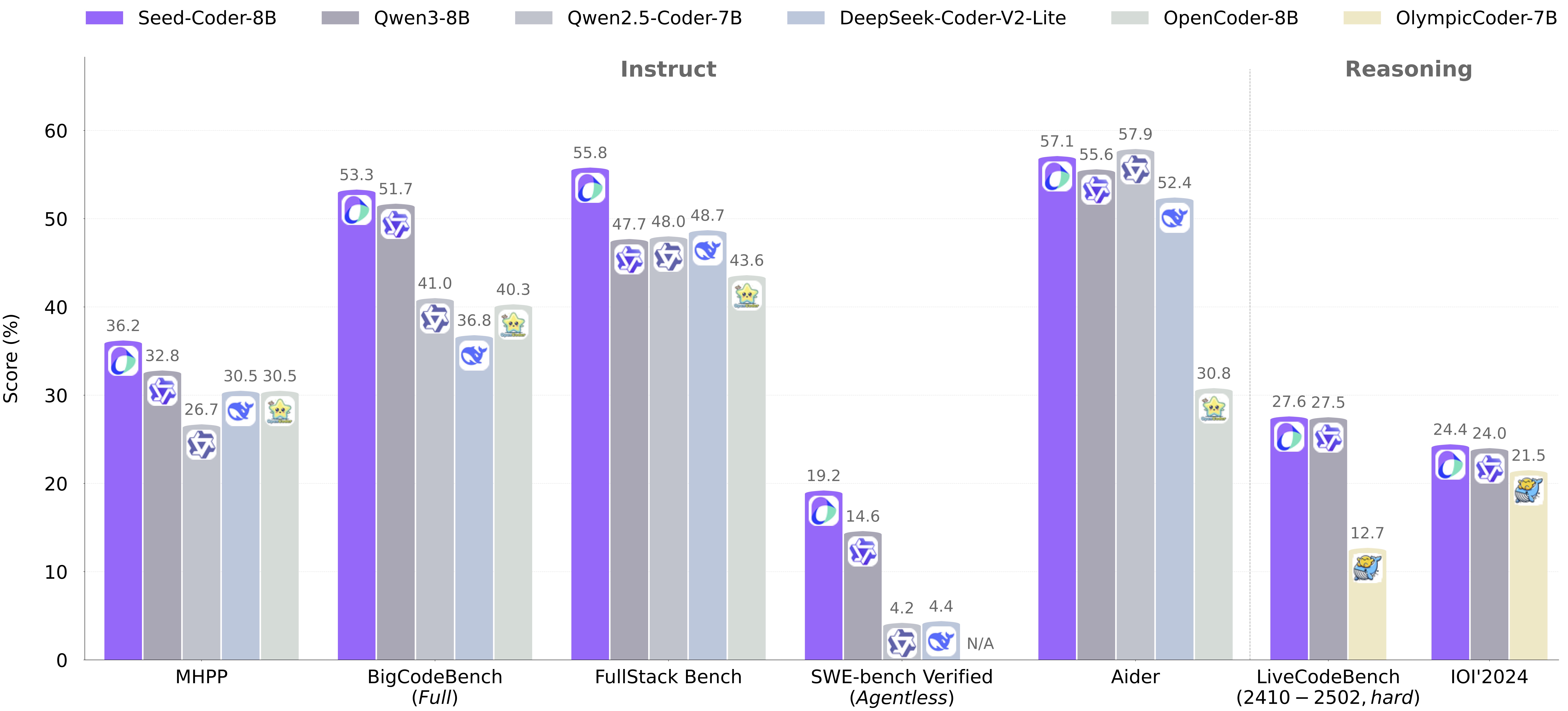Seed-Coder-8B-Base
Introduction
We are thrilled to introduce Seed-Coder, a powerful, transparent, and parameter-efficient family of open-source code models at the 8B scale, featuring base, instruct, and reasoning variants. Seed-Coder contributes to promote the evolution of open code models through the following highlights.
- Model-centric: Seed-Coder predominantly leverages LLMs instead of hand-crafted rules for code data filtering, minimizing manual effort in pretraining data construction.
- Transparent: We openly share detailed insights into our model-centric data pipeline, including methods for curating GitHub data, commits data, and code-related web data.
- Powerful: Seed-Coder achieves state-of-the-art performance among open-source models of comparable size across a diverse range of coding tasks.

This repo contains the Seed-Coder-8B-Base model, with the following features:
- Type: Causal language models
- Training Stage: Pretraining
- Data Source: GitHub data, code-related web data
- Training Tokens: 6 trillion
- Supports: Code completion, code infilling (Fill-in-the-Middle)
- Context Length: 32,768
Model Downloads
| Model Name | Length | Download | Notes |
|---|---|---|---|
| 👉 Seed-Coder-8B-Base | 32K | 🤗 Model | Pretrained on our model-centric code data. |
| Seed-Coder-8B-Instruct | 32K | 🤗 Model | Instruction-tuned for alignment with user intent. |
| Seed-Coder-8B-Reasoning | 32K | 🤗 Model | RL trained to boost reasoning capabilities. |
Requirements
You will need to install the latest versions of transformers and accelerate:
pip install -U transformers accelerate
Quickstart
Here is a simple example demonstrating how to load the model and perform code generation using the Hugging Face pipeline API:
import transformers
import torch
model_id = "ByteDance-Seed/Seed-Coder-8B-Base"
pipeline = transformers.pipeline(
"text-generation",
model=model_id,
model_kwargs={"torch_dtype": torch.bfloat16},
device_map="auto",
)
output = pipeline("def say_hello_world():", max_new_tokens=100)
print(output[0]["generated_text"])
Fill-in-the-Middle (FIM) Example
Seed-Coder-8B-Base natively supports Fill-in-the-Middle (FIM) tasks, where the model is given a prefix and a suffix and asked to predict the missing middle content. This allows for code infilling scenarios such as completing a function body or inserting missing logic between two pieces of code.
A typical example:
import transformers
import torch
model_id = "ByteDance-Seed/Seed-Coder-8B-Base"
pipeline = transformers.pipeline(
"text-generation",
model=model_id,
model_kwargs={"torch_dtype": torch.bfloat16},
device_map="auto",
)
# You can concatenate a prefix, a special FIM separator token, and a suffix
prefix = "def add_numbers(a, b):\n "
suffix = "\n return result"
# Combine prefix and suffix following the FIM format
fim_input = '<[fim-suffix]>' + suffix + '<[fim-prefix]>' + prefix + '<[fim-middle]>'
output = pipeline(fim_input, max_new_tokens=512)
print(output[0]["generated_text"])
Evaluation
Seed-Coder-8B-Base has been evaluated on code generation, code completion, and code reasoning benchmarks, achieving state-of-the-art performance among ~8B open-source models.
| DeepSeek-Coder-6.7B-Base | OpenCoder-8B-Base | Qwen2.5-Coder-7B | Seed-Coder-8B-Base | |
|---|---|---|---|---|
| HumanEval | 47.6 | 66.5 | 72.0 | 77.4 |
| MBPP | 70.2 | 79.9 | 79.4 | 82.0 |
| MultiPL-E | 44.7 | 61.0 | 58.8 | 67.6 |
| cruxeval-O | 41.0 | 43.9 | 56.0 | 48.4 |
For detailed benchmark performance, please refer to our 📑 Technical Report.
License
This project is licensed under the MIT License. See the LICENSE file for details.
- Downloads last month
- 186

-Technical%20Report-brightgreen?logo=arxiv&logoColor=white)

